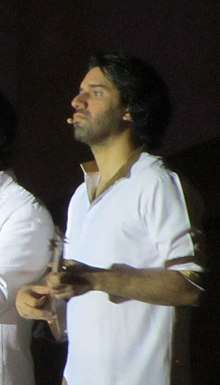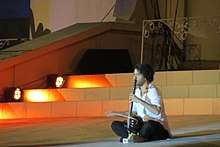Sohrab Pournazeri
Sohrab Pournazeri (Persian: سهراب پور ناظری) is an Iranian musician and composer born in 1983 in Kermanshah. He plays Kamancheh and tanbour.
Sohrab Pournazeri | |
|---|---|
 | |
| Background information | |
| Born | 1983 Kermanshah, Iran |
| Genres | Persian/Iranian Classical Music |
| Occupation(s) | Soloist, composer |
| Instruments | Kamancheh, Tanbour, Daf, Tar, Setar |
| Years active | 1997–present |
| Website | Sohrab Pournazeri Official |
Life
Sohrab Pournazeri was born in Kermanshah on April 25, 1983, to Kurdish parents and had a musical upbringing. His father, Kaykhosrow Pournazeri was a well-known musician who played tanbour and tar. Kaykhosrow Pournazeri was the founder of the first ensemble of tanbour, he introduced this sacred instrument of Ahl-e Haqq to the urban musical culture of Iran. His ensemble also introduced several musicians that later became established artists of Persian music.

At a very young age, Sohrab began studying tanbour and daf, and later tar and setar before finding his true calling by taking up kamancheh. Sohrab's first choice was the folk instrument of tanbour due to his orientation, but he added kamancheh to improve his career as Iranian classical musician. He began performing before audiences with Shams Ensemble at the age of fifteen.
Sohrab Purnazeri learned tanbour from his father, Kaykhosrow Pournazeri, kamancheh from Ardeshir Kamkar, vocalization from Hamid Reza Noorbakhsh. He received his bachelor's degree in music from the Faculty of the Arts, Sooreh University in Tehran in 2001.
Career
Souhrab Pournazeri currently plays with Shams Ensemble which was established in 1980 and is focused on Persian classical music as well as musical tradition of Sufi and Ahl-e Haqq culture. Pournazeri's primary performance instruments are kamancheh and tanbour.
Playing style
Sohrab Pournazeri's style is rooted in both Persian classical music as well as folk and sacred musical culture of Ahl-e Haqq in Iranian Western province of Kermanshah.
Live performances
- 2011: USA tour with Shams Ensemble
- 2010: Omar Khayyám project with Alireza Ghorbani, Dorsaf Hamdani and Ali Ghamsari